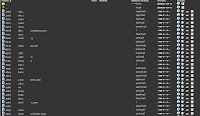 Is the once popular in the second quarter of 2007, embedded malware tactic on the verge of irrelevance, and if so, what has contributed to its decline? Have SQL injections executed through botnets turned into the most efficient way to infect hundreds of thousands of legitimate web sites? Depends on who you're dealing with.
Is the once popular in the second quarter of 2007, embedded malware tactic on the verge of irrelevance, and if so, what has contributed to its decline? Have SQL injections executed through botnets turned into the most efficient way to infect hundreds of thousands of legitimate web sites? Depends on who you're dealing with.A cyber criminal's position in the "underground food chain" can be easily tracked down on the basis of tools and tactics that he's taking advantage of, in fact, some would on purposely misinform on what their actual capabilities are in order not to attract too much attention to their real ones, consisting of high-profile compromises at hundreds of high-profile web sites.
 Embedded malware may not be as hot as it used to be in the last quarter of 2007, but thanks to the oversupply of stolen accounting data, certain individuals within the underground ecosystem seem to be abusing entire portfolios of domains on the basis of purchasing access to the compromised accounts. In fact, the oversupply of compromised Cpanel accounts is logically resulting in their decreasing price, with the sellers differentiating their propositions, and charging premium prices based on the site's page ranks and traffic, measured through publicly available services, or through the internal statistics.
Embedded malware may not be as hot as it used to be in the last quarter of 2007, but thanks to the oversupply of stolen accounting data, certain individuals within the underground ecosystem seem to be abusing entire portfolios of domains on the basis of purchasing access to the compromised accounts. In fact, the oversupply of compromised Cpanel accounts is logically resulting in their decreasing price, with the sellers differentiating their propositions, and charging premium prices based on the site's page ranks and traffic, measured through publicly available services, or through the internal statistics.
SQL injections may be the tactic of choice for the time being, but as long as stolen accounting data consisting of Cpanel logins, and web shells access to misconfigured web servers remain desired underground goods, goold old fashioned embedded malware will continue taking place.
Interestingly, from an economic perspective, the way the seller markets his goods, can greatly influence the way they get abused given he continues offering after-sale services and support. It's blackhat search engine optimization I have in mind, sometimes the tactic of choice especially given its high liquidity in respect to monetizing the compromised access.
The bottom line - for the time being, there's a higher probability that your web properties will get SQL injected, than IFRAME-ed, as it used to be half a year ago, and that's because what used to be a situation where malicious parties would aim at launching a targeted attack at high profile site and abuse the huge traffic it receives, is today's pragmatic reality where a couple of hundred low profile web sites can in fact return more traffic to the cyber criminals, and greatly extend the lifecycle of their campaign taking advantage of the fact the the low profile site owners would remain infected and vulnerable for months to come.
Related posts:
Embedding Malicious IFRAMEs Through Stolen FTP Accounts
Injecting IFRAMEs by Abusing Input Validation
Money Mule Recruiters use ASProx's Fast-flux Services
Malware Domains Used in the SQL Injection Attacks
Obfuscating Fast-fluxed SQL Injected Domains
SQL Injecting Malicious Doorways to Serve Malware
Yet Another Massive SQL Injection Spotted in the Wild
Malware Domains Used in the SQL Injection Attacks
SQL Injection Through Search Engines Reconnaissance
Google Hacking for Vulnerabilities
Fast-Fluxing SQL injection attacks executed from the Asprox botnet
Sony PlayStation's site SQL injected, redirecting to rogue security software
Redmond Magazine Successfully SQL Injected by Chinese Hacktivists



0 Comments: